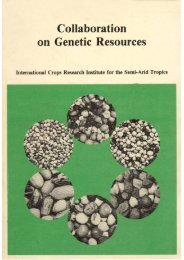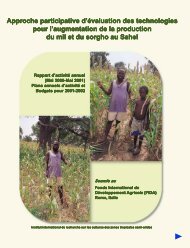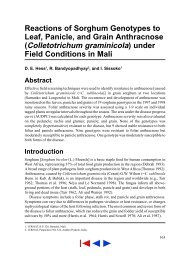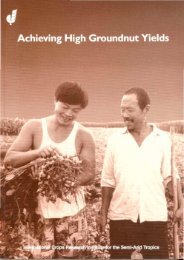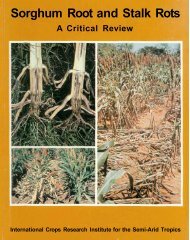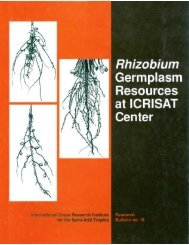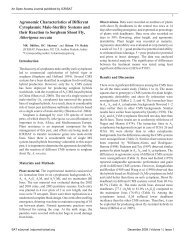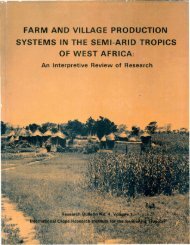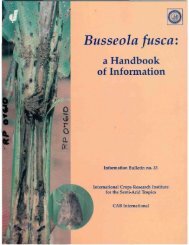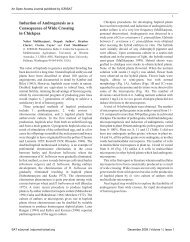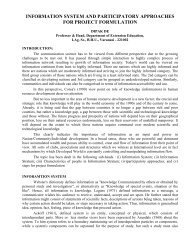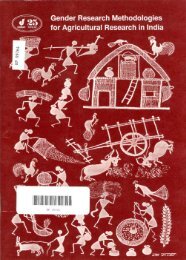RA 00110.pdf - OAR@ICRISAT
RA 00110.pdf - OAR@ICRISAT
RA 00110.pdf - OAR@ICRISAT
Create successful ePaper yourself
Turn your PDF publications into a flip-book with our unique Google optimized e-Paper software.
Discussion<br />
Squire's paper drew on data from India, West<br />
Africa, and controlled environment conditions in<br />
the UK, and provided a review of the relationships be<br />
tween many of the important environmental variables,<br />
and pearl millet growth.<br />
The discussion centered around the usefulness<br />
and application of these data, on the simple model<br />
presented, and the general acceptance of the root<br />
growth data and its measurement. The overall opinion<br />
was that the model was flexible, but the speaker<br />
admitted that more good data were required, particularly<br />
in relation to roots. The importance of saturation<br />
deficit was not challenged, and the speaker<br />
agreed that traditional methods for the measurements<br />
of roots and soil-water such as potentiometers<br />
and the neutron probe were probably better than<br />
sophisticated tracer methods.<br />
Matlon's paper clearly showed that interpretation<br />
of experiment station data, generated utilizing many<br />
inputs not available to West African farmers, should<br />
be done cautiously. Similar caution should be<br />
observed when comparing data from the three climatic<br />
zones, the Sahel, the Sudanian, and the<br />
Northern Guinean Zones. The discussion centered<br />
around these two issues.<br />
The poor response of new cultivars compared to<br />
locals under both low- and higher-input conditions<br />
on farmers' fields was clearly disturbing to the<br />
audience, but the consensus, substantiated by the<br />
data presented, was that this is a problem, and<br />
ICRISAT should concentrate on solving it. There<br />
was some disagreement about the statement that<br />
very early-maturing cultivars will have no impact<br />
unless management practices change.<br />
There was general acceptance that the primary<br />
goal in the Sahel is to increase the responsiveness of<br />
new cultivars to improved management, but that in<br />
the other two zones, the goal is to improve yield<br />
stability. The group endorsed a comment that more<br />
emphasis should be put on soil and water management<br />
in West Africa.<br />
Fussell's paper provided potential solutions to the<br />
problems outlined in Matlon's paper. Little progress<br />
would be made in increasing grain yield unless fertilizer<br />
is used, particularly phosphate. This was accepted<br />
with the proviso that the importance of water and<br />
soil management should not be completely dismissed.<br />
Gautam's paper described the management practices<br />
to increase and stablize production in India.<br />
The discussion centered on matching plant populations<br />
to different environments, and the placement<br />
and timing of fertilizer applications.<br />
Bidinger's paper, which acknowledged that plants<br />
have no immunity to environmental stresses, presented<br />
a physiological approach to breeding for<br />
'resistance' to such stresses. A stepwise approach,<br />
using data from Niger and India, was used to illustrate<br />
the approach. Poor crop establishment and<br />
inadequate grain filling were used as examples. The<br />
discussion centered on whether the approach was<br />
over simplified, and whether there was a danger in<br />
examining growth stages or stress periods separately.<br />
Bidinger argued that understanding each stage<br />
separately and clearly defining the problems in a<br />
particular climatic zone was necessary. It was agreed<br />
that stress incurred in the seedling stage, provided<br />
the seedling survived, could be advantageous to a<br />
plant subjected to stress in the later stages of<br />
development.<br />
279



